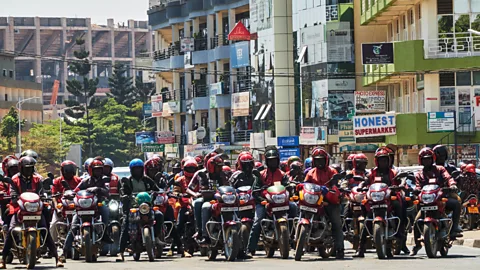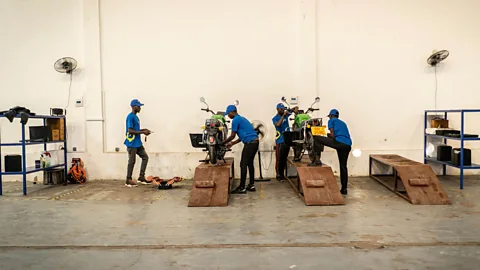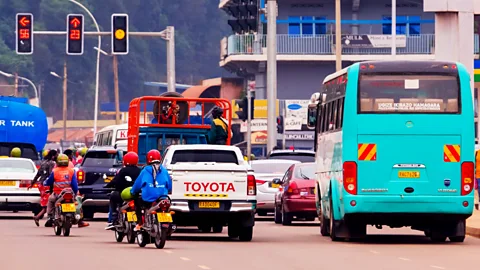The grid is weak. The bikes are electric. Rwanda is betting it'll work anyway
 Getty Images
Getty ImagesThere are 100,000 motorbikes in Rwanda. The country wants to turn them all electric, and startups say their plans can make it work. Can green tech steer Africa towards the future?
Over the past decade, electric vehicles have been an integral part of the West's planned transition to green energy, offering a variety of opportunities for carbon-hungry industries such as transportation, freight and logistics. But outside of urban hubs in places like the US, the EU and east Asia, the promise of e-mobility is often harder to realise. In Africa, for example, widespread problems with power distribution are a serious roadblock for the adoption of electric vehicles. Rwanda, however, is thinking differently.
The tiny East African nation has a grand plan to convert its over 100,000 motorbikes to e-bikes. Officials know the project will put significant pressure on the country's electricity grid, but a host of e-bike startups are experimenting with innovative solutions. That includes solar-powered electricity stations, battery swapping plans, repurposing or recycling batteries as they wear down, and mini-grids (small, localised power generation systems that operate off-grid). The aim is to power large e-bike fleets without interrupting its national electricity distribution. If it works, this could be a model for the rest of Africa and other corners of the developing world.
 Getty Images
Getty ImagesRwanda's greenhouse gas emissions were projected to double between 2015 and 2030, but interest in e-mobility exploded after the government pledged to reduce its rising emissions by 38% during the same period (approximately 4.6 metric tonnes). Other African countries like Kenya, Togo, Nigeria and South Africa have rolled out assertive policies to promote their transition to clean energy – from subsidies on renewable energy to tax breaks and reduced import duties on electric vehicles.
Yet Rwanda is recording the most success, says Michael Irenge, an engineer based in the country who works at NETIS Group, a telecommunications and energy infrastructure firm. With cutting-edge renewable energy plans, a $300m (£226m) investment project to finance climate resilience, government incentives for electric vehicles and a host of enterprising e-bike startups, Irenge and others argue that Rwanda is helping to set new standards for African e-mobility.
E-bikes take centre stage
For several decades before Rwanda's ambitious "Green Growth" pivot, gas-powered motorcycles were the norm – a staple even, as in many other African countries. This poses a problem. In 2021, the Rwandan National Gas Inventory Commission showed that taxi motorcycles alone contributed the equivalent of 427.45 gigagrams of CO2, making up 32% of the total emissions from road traffic.
Companies such as Ampersand, Spiro, eWaka and Rwanda Electric Motors (REM) say they have the solution. Startups have already sold, rented and leased thousands of these motorbikes (or "motars", as they're known in Rwanda) through cost-effective schemes, according to Toffene Kama, a Senegalese venture capitalist with investments in the electric vehicle industry. "In many cases, the battery will be provided by the e-bike operating company which rents them out," which makes the bikes more accessible by lowering upfront costs, Kama says. So far, their mission to push riders to switch from fossil fuel to electric vehicles has taken off on a broad scale, he says, thanks in large part to heavy support from the government.
On two major fronts, these startups are making progress. First, they're helping the country cut down carbon emissions from road traffic, according to Josh Whale, chief executive of the e-bike company Ampersand. Whale says the bikes can eliminate a dramatic share of the annual greenhouse gas emissions you'd expect from a traditional motorcycle.
 Getty Images
Getty Images"Depending on what the grid mix is [the proportionate shares of a power grid's energy sources], our e-bikes eliminate 75% to 100% emissions of greenhouse gases every year," he says. A 100% cut would require an entirely renewable energy system, but still, Ampersand says the 2,750 bikes it currently has in the country curb about 7,000 tonnes of emissions a year.
Sylvie Nyirahirwa, an energy economist at Rwanda's Ministry of Infrastructure, confirms this. "As of March 2024, Rwanda has about 4,800 electric motorcycles in operation," Nyirahirwa says. "According to the global average, each bike can cut down 2.6 tonnes of carbon dioxide every year, but the reduction can differ based on renewable energy in the grid." Though the Ministry hasn't quantified the overall carbon emissions, the replacing gas motorcycles is already reaping climate benefits for the East African country.
The startups are also helping to cut down costs for both taxi motorcycles and delivery companies, the primary target market for these products. "I can confirm that an e-bike sells for about the same price as a traditional gas-powered bike on average [about £880, or $1,168] without the battery. But recharging them takes less than half of the cost of purchasing fuel for the same distances," Kama says. To reduce the upfront cost, riders can choose to retrofit old gas-powered bikes with an electric engine, apply for loans or rent batteries. Renting is becoming the most popular option, he adds.
"A lot of the finance providers offer cheap credit to purchases of our electric motorbikes because we separate the cost of the battery. It works on a pay-as-you-go basis," Whale says. "The net result is that the customers end up enjoying lower interest rates and the cost of the bike ends up being the same or even cheaper than the conventional petrol bike." Ampersand says its riders save about $400 to $750 (about £305 to £572) yearly on their e-bikes.
Rwanda's power distribution problem
Africa has never been at the forefront of stable electricity distribution, yet some countries are recording more progress than others, particularly in East Africa. In Rwanda, concerted efforts by the government have seen a consistent rise in power distribution across the country over the past decade, though promised developments don't always match reality.
Ron Weiss, the former chief executive of the Rwandan Energy Group (REG), predicted in 2018 that power outages would end by 2020, in line with REG's grand financing plan to scale electricity. Since then, the company says the number of households hooked up to the national electricity grid went from 43% in 2018 to 53% in 2024. But Rwandans still complain about consistent power outages impacting their commercialisation efforts, and REG has fallen far short of its goals, according to a recent report in Rwanda's New Times newspaper. The company plans to beat this problem with several off-grid energy sources, but says it needs heavy funding and another four years to complete the effort.
 Getty Images
Getty ImagesElectricity distribution is a serious hurdle, says Emmanuel Mayani, a Rwandan clean energy research assistant at the University of Michigan in the US. E-bikes require regular charging – some three to five times a day – and the majority of charging stations for e-bike start-ups in Rwanda and elsewhere in Africa are still predominantly grid-reliant.
"Even though they plan to pivot to renewable energy sources, charging infrastructure for many e-bike startups still largely relies on grid technology, as this is what is most convenient for them and the region they're in," Mayani says.
Experts believe that a high demand for e-bikes and large-scale expansion plans for these startups mean more charging stations will fill up cities, especially as the Rwandan government is providing rent-free land for charging infrastructure. That could be a problem.
Mayani stresses that this could lead to more frequent power outages that could affect residential and commercial electricity supply, and strain infrastructure that is already struggling to keep up with growing demand. "If you keep increasing just the e-bikes, you're increasing consumers of electricity without increasing the source, the generation or the amount of electricity the consumers are going to access," he says. This will exacerbate load shedding, the name for intentionally planned power outages which are meant to take pressure off the grid, he adds.
But Mayani also thinks this issue can be abated if there's an alternative to support the grid, and solar power is a good start. "[The government] could bring in solar panel providers to take the pressure off," he says. "It's a good alternative for people in rural communities who'll experience these outages more."
As the Rwandan government works to use renewable energy sources to build its grid infrastructure by 2030, Ampersand is already installing solar panels in its battery swap stations to target a large part of the country's off-grid regions. Experts hope that other e-bike companies will follow suit.
Solar-powered battery swap stations
Rwanda gets some of the highest energy from solar radiation in Africa, far beyond what solar panels require, and Ampersand plans to use this to its advantage. The company has already executed this in some rural areas in Kenya, where the availability of rentable land made it easy to install ground-mounted solar converters, according to Whale. It made combining grid energy with solar for Ampersand swap stations seamless.
Elsewhere in Africa, companies are testing solar power as an off-grid alternative for e-bike charging. Startups like Ghana's Kofa use solar energy to power their battery swap stations, while others like Ampersand opt for a combination with grid energy. In these swap stations, sets of batteries are at all times connected to a charging system – about 20 to 40 of them, according to Kama. E-bike riders drive in every three to four hours for a battery exchange, and replacing a run-down battery with a fully charged one is quick, he says. "The swapping process is like a two-minute thing," Kama explains. "Sometimes it's even faster than, for example, refueling [a gas-powered motorcycle] in an oil and gas station." (Read more about China's battery swap stations for electric vehicles).
Another way Ampersand gets solar energy is through its partnership with the oil company TotalEnergies. Total has solar generators at 1,000 of its 4,800 petrol stations in Africa, selling electricity to a variety of different players, including EV startups. Ampersand uses a shared space with them and directly taps into Total's solar generators to charge its batteries.
 Alamy
AlamyThis means "we don't have to make an upfront capital investment in the solar project", Whale says. This kind of arrangement isn't common in Rwanda yet, but Ampersand plans to extend the partnership to the country soon.
Spiro, one of Africa's largest e-bike startups which has put over 17,000 bikes across Togo, Benin, Kenya and recently, Rwanda, uses grid energy for its operations. But in its plans for expansion, the company is thinking about solar power.
"We're an Equitane group company, and another subsidiary of the company is called Solen, which is into rooftop solar installation," says Kaushik Burman, Spiro's chief executive. "There are conversations happening for Solen to install a solar project that would be feedstock for our swap stations."
Old batteries for new grids
According to Burman, a more practical concern about renewable energy is how it can be preserved for long-term use. "We don't get renewable power 24 hours a day," he says, "so we have to think about how to store that energy to be able to use it during the hours when the sun isn't shining. That's what we're concerned about."
Whale agrees. Whether it's wind, solar, geothermal, hydropower or biomass-powered battery stations, energy can only be maximised if it can be properly stored. Ampersand aims to get out in front of this problem by focusing on two things: using advanced battery technology, and repurposing spent batteries for energy projects like mini-grids (a set of small electricity generators functioning as a single, independent system).
"Because we've had motorcycles on the road for over five years now, we are starting to look at what happens to the batteries once they reach the end of their first life – which is when they're over five years old and they've degraded down to the point where they're only 80% of their original capacity," Whale says. "What we can do is repurpose those batteries and repack them into larger units that can provide energy storage for off-grid solar systems like mini-grids." Not only will these batteries power e-bikes, Ampersand plans to open these mini-grids for communal use.
 Getty Images
Getty ImagesIn Africa, mini-grids are gaining momentum in weak-grid and off-grid areas, and could provide electricity to 380 million people by 2030. E-bikes often use lithium iron phosphate batteries (LiFePO4), and a World Economic Forum (WEF) report says the stability, durability and performance of these batteries make them particularly well suited for mini-grids. In fact, the WEF report argues that used batteries, given a second life, often work better than the brand new batteries that are typically sold in markets that are just getting access to power.
Ampersand is already repurposing its old e-bike batteries in partnership with SLS Energy, a Rwandan e-waste management company that uses retired batteries to provide a variety of low-cost energy solutions.
So far, the partnership with Ampersand has launched a 120kWh mini-grid in Zambia, according to Léandre Berwa, SLS Energy's chief executive. "This system can power more than 100 rural African homes for two days on a single full charge," he says, with the average daily consumption estimated at 0.49 kWh.
"[Ampersand] supply us with batteries at their end-of-life in their mobility and we use them in our second-life applications, then we extend the batteries' usable lifespan by repurposing them to stationary applications, Berwa says." This creates the missing link for a sustainable adoption of electric mobility."
More like this:
• Are China's swap stations the future of electric cars?
• Where EV batteries go to die – and be reborn
• 'A bullet train for power': China's ultra-high-voltage electricity grid
Rwanda is still far from its 100% mobility electrification plans, yet it has set the groundwork to lead Africa's energy resolution through off-grid and renewable energy sources, which according to Kama, will be the main driver of electric vehicles. "Once this off-grid energy is scaled up, e-mobility will become pervasive. But it's not just about e-bikes or EVs, but also being able to power surrounding commercial activity," he says.
Rwanda's e-bike gamble is a bold experiment in an African context, where electric vehicles are choked by limited power grids. But novel solutions – from harnessing solar power to rapid battery swaps – offer a chance to bolster e-bikes' viability and contribute to wider electrification efforts across the country. The results of these strategies will deliver critical lessons for Rwanda, and may even shape the future of transportation across the developing world.
--
If you liked this story, sign up for The Essential List newsletter – a handpicked selection of features, videos and can't-miss news, delivered to your inbox twice a week.
